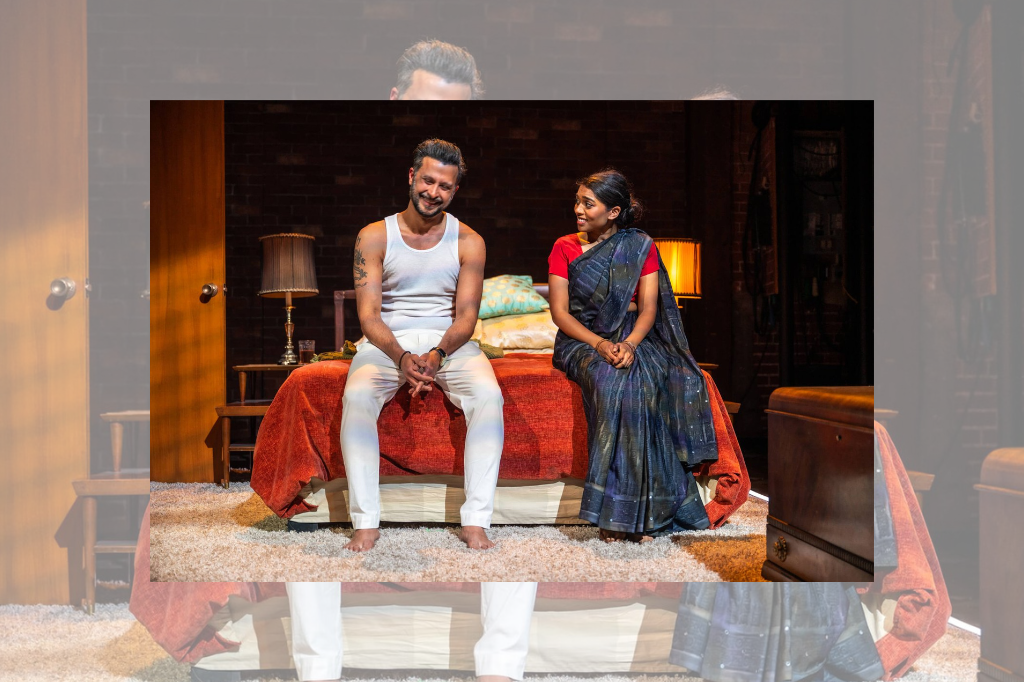REVIEW: New at Necessary Angel/Royal Manitoba Theatre Company
“Has anyone ever drowned in the snow?” Arranged bride Nuzha tentatively asks this question of her new husband, Qasim, near the end of the first act of Pamela Mala Sinha’s astonishing play New, a production from Necessary Angel and the Royal Manitoba Theatre Company at Canadian Stage. In 1970 Winnipeg, thousands of miles from her home in India and entirely removed from her support system, Nuzha doesn’t need a blanket of snow to smother her. Qasim, her reluctant spouse in love with a Canadian woman, is doing a good enough job with his diffident, icy politeness.
In the international residence at a Winnipeg university, traditions are always mingling, yet the characters in New face both cultural and self-imposed barriers that cause them to feel completely alone. In the assured hands of director Alan Dilworth, with a searing script that is alternately witty and wistful, powerful performances, and time capsule-worthy design, New is one of the most captivating productions I’ve seen in a long time.
Three wedded pairs form the core of the show, all upwardly-mobile Bengali intelligentsia. There’s medical doctor Qasim (Ali Kazmi) and his younger, delicate-looking bride (Mirabella Sundar Singh); Sachin (Fuad Ahmed), who broods like a romance novel hero, and Sita (playwright Sinha), who used to travel the world as a dancer in Uday (brother of Ravi) Shankar’s classical troupe; and status-quo-disturbing grad student Aisha (Dalal Badr) and her husband Ash (Shelly Antony), who seems to stash pot everywhere. Orbiting them is Qasim’s white girlfriend Abby (Alicia Johnston), a nurse with aspirations to become a doctor who finds out about his marriage only after it happens. Each couple is separated by pain, loss, or the inability to be fully themselves, the characters holding their hurts close to their hearts like valuable heirlooms.
Sinha writes in the play’s author’s note that she wanted to show the “vibrant, cigarette-holding, scotch-drinking” world of her parents, fictionalizing aspects of her mother’s and father’s experience after immigrating to Manitoba in the mid 1960’s. Unlike the familiar sitcom style of showing immigration through second or third-generation children and their befuddled, traditional parents, New shows us that Mom and Dad were once baddies in their own right.
The young men and women are a product of their time, cultural experience, and own distinctive personalities. They drink, smoke, and swear; they have parties, affairs, and protests. A scene where Qasim solemnizes his religious marriage vows with the phone in one hand and suddenly, guiltily, puts down the whiskey in the other embodies his conflicted experience while giving us a laugh of recognition.
Tradition is very important to these characters in theory because of the way it connects them to family, but comes stiffly, awkwardly unlike their parents’ generation, for whom it’s as much of a part of daily life as breathing. For example, Sita is desperate for perfection in a familial bonding ritual that makes her and Qasim non-blood-related siblings. At the same time, none of them remember how the ritual goes in full, and they reflexively describe each other as “bad Hindus” and “bad Muslims” in turn.
Even Qasim’s mother on the other end of the phone isn’t merely backwards and beholden to tradition; her desire for Qasim’s marriage to Nuzha hinges on a tragic piece of family history related to the partition of India that gives it more nuanced relevance.
Meanwhile, everyone is on the cusp of self-discovery during an explosive era of counterculture. Women discuss not wanting children now or potentially at all on the road to new jobs and financial freedom. Aisha gleefully grinds a sexism-drenched beauty contest to a halt. There are frank discussions about sex and sexuality, the precarity of immigration status, and whether it would be better for the Bengalis to stay as part of the international student residence or simply form their own, more insular collective. While issues are always bubbling under the play’s surface, Sinha’s script, full of lyrical monologues and snappy exchanges, results in a show that prioritizes character over message. One moment, Qasim fails to be the one to greet his new bride at the airport in a sitcom-worthy predicament; the next, Sita mourns a tragic loss in an elegant verbal calligraphy.
The extra-wide set by Lorenzo Savoini serves equally as each couple’s apartment, with projections elegantly telling us where we are and when. Dilworth’s choice to have the set do triple duty is smart both in avoiding clutter and indicating the sameness of university housing. A kitchen and a bedroom border the living room in the middle. Furnished in mid-century modern lived-in chic in shades of brown, the living room is dominated by a banquette with a record player, which Ash gleefully uses to play the newest album by The Doors. The rooms are divided by strips of light, which also frame the entryways between them. It’s a little distracting when Dilworth’s direction causes actors to reset in scene breaks by crossing over these boundaries between rooms, but it’s also a way to delineate those pauses from the relentless scenes surrounding them.
“You’re different when you’re speaking Bengali,” Abby beams at Qasim, not knowing a word of what he’s saying. Sinha uses a device similar to one used in Tom Stoppard’s Rock and Roll, where the Indian characters speak without an accent when speaking Bengali, and with an accent when they switch to English; she uses this convention for humour, as sometimes the English and Bengali don’t quite match in context. It also helps represent the comparatively relaxed comfort of a first language, as the characters speak in English to varying degrees. Qasim, wanting to be with Abby, most fluently switches between the two, while Sita rarely speaks in English because she “refuses to do anything she’s not good at.” Her relative silence in English proves a metaphor for desire to keep to herself, unable to move past her loss.
The cast imbues Sinha’s script with further magic. Sinha’s scream as Sachin brings up a pain too difficult for Sita to bear is heartrending. Johnston as boisterous Abby fully sells the breakdown of an independent woman with a tough shell who lets her guard down for one last chance at love only to lose everything. Kazmi as Qasim sells both his desperate protests to Abby that the marriage was a necessity for familial reasons and his utter deadness inside towards Nuzha, but that doesn’t make either woman’s heartbreak any easier. Ahmed’s brooding intensity as Sachin goes from hypnotic to overbearing as if by the flick of a switch, and Antony clearly shows us Ash’s happy-go-lucky attitude is hiding something from the get-go. Badr makes Aisha a firecracker, the woman you wish you hung out with in grad school.
It’s Sundar Singh as Nuzha, though, who steals the show. While most other characters feel stuck pacing the same steps, Nuzha crackles with restlessness; the night she arrives, she climbs onto her marital bed, turning around three times like a cat settling into place before artfully draping her gorgeous jewel-toned sari (costumes by Michelle Bohn) around her.
While Nuzha’s situation has all the markings of a tragedy in the making, she reveals a growing core of steel inside. It’s her choice to accept her imperfections and move forward that gives the play its hopeful ending, and you might wish for a sequel or two following her story as she turns from the ice of her marriage into the sunlight.
After all, as Sachin reassures her that first, bleak fall, nobody’s yet drowned in the Winnipeg snow.
New runs at the Berkeley Street Theatre April 24 through May 14, 2023.














Comments